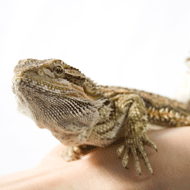Salmonella warning issued to reptile handlers

In the last eight months, at least four cases of salmonella infection in Forth Valley have been linked to bearded dragons.
People who care for bearded dragons and other reptiles have been warned to be aware of the risks of salmonella.
Public health experts in NHS Forth Valley say there have been at least four cases of salmonella infection linked with bearded dragons over the past eight months alone.
The disease causes vomiting and diarrhoea which can last for several months in some cases. While it is not usually life threatening, complications can arise in very young, very old and immune-compromised individuals.
Reptile owners and carers are being urged to take strict hygiene precautions as salmonella can be carried in the gut and shed in droppings. Bacteria quickly spreads over the skin and can contaminate anything the reptile comes into contact with.
Health experts say children are particularly at risk as they are prone to stroking and handling pet reptiles.
The Health Protection Agency (HPA) has produced a guide called "Reducing the risks of salmonella infection in reptiles". Advice includes thorough hand washing after feeding reptiles or handling them, their cage or other equipment.
Visit the HPA website to view the guide.



 The RCVS has announced a new version of its 1CPD mobile app, with enhanced features for veterinary surgeons and veterinary nurses to record their continuing professional development.
The RCVS has announced a new version of its 1CPD mobile app, with enhanced features for veterinary surgeons and veterinary nurses to record their continuing professional development.